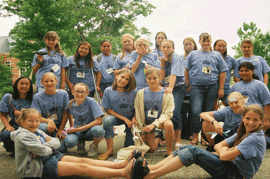

Tricia D. Shepherd

cCWCS Computational & Theoretical Chemistry Workshops

MERCURY Consortium
Computational chemistry faculty from undergraduate institutions across the US have formed a consortium known as the Molecular Education and Research Consortium in Undergraduate computational chemistRY (MERCURY). The consortium allows faculty and students access to state-of-the art computational power and numerous opportunities for student and faculty collaboration and mentoring. The annual MERCURY Conference in Computational Chemistry highlights the research done by students at primarily undergraduate institutions.
The Chemistry Collaborations, Workshops and Communities of Scholars (cCWCS) program funded by the NSF TUES program provides workshops for faculty at 2- and 4-year colleges and universities. Georgia Tech Professors Rigoberto Hernandez and David Sherrill and I instruct a workshop on Computational & Theoretical Chemistry. Our goal is to provide a working understanding of theoretical and computational methods for understanding molecules and their reactivity in the gas- and liquid- phases, and (ii) introduce existing software for obtaining observable quantities describing such systems.
AWE+SUM camps are open to girls entering the eighth grade this fall. Each camp includes three fun-filled days filled with interactive learning experiences in both science and math and a taste of life on the Westminster college campus. Dr. Robyn Hyde and I offer a combine experimental and theoretical investigation exploring water and fat solubility using molecular modeling software (Spartan by Wavefunction, Inc.) and the scientific method of test/collect data/analyze/draw conclusions.
